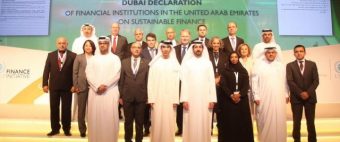 H.E. Dr. Thani Ahmed Al Zeyoudi, Minister of Climate Change and Environment, inaugurated the UN Environment Program Finance Initiative’s 14th Global Roundtable event, hosted by the United Arab Emirates, represented by the Ministry of Climate Change and Environment and in collaboration with the UAE’s Central Bank, for the first time in the region on 25-26 October 2016 at the Grand Hyatt Hotel in Dubai.
H.E. Dr. Thani Ahmed Al Zeyoudi, Minister of Climate Change and Environment, inaugurated the UN Environment Program Finance Initiative’s 14th Global Roundtable event, hosted by the United Arab Emirates, represented by the Ministry of Climate Change and Environment and in collaboration with the UAE’s Central Bank, for the first time in the region on 25-26 October 2016 at the Grand Hyatt Hotel in Dubai.
In his opening remarks, Dr. Thani Ahmed Al Zeyoudi extended great thanks and gratitude to His Highness Sheikh Hamdan bin Mohammed Al Maktoum, Crown Prince of Dubai, Chairman of the Executive Council, for his patronage of this event and his continued support for the efforts to transform UAE’s national economy to a green low-carbon economy.
His Excellency said: “The process of transformation towards a green economy approach has been slow in many countries as a result of the absence or ineffectiveness of some basic tools, such as policies, partnerships, technology, financing and resource mobilization, to facilitate the transformation process; but that’s not the case in the UAE, which has taken bold and swift steps in that direction.
We are meeting here today to continue the discussion of funding sustainable development projects and we all hope to contribute to the positive atmosphere created by the globally accepted Sustainable Development Goals 2030 and the Paris Agreement on climate change to overcome the obstacles of securing the necessary funding for the process of transformation, especially in the least developed countries.”
Dr. Al Zeyoudi indicated that the issue of financing green investments is a main approach in the UAE Green Development Strategy, launched by His Highness Sheikh Mohammed bin Rashid Al Maktoum, UAE Vice President Prime Minister and Ruler of Dubai, under the slogan “Green Economy for Sustainable Development”, and a key element in the green agenda. He also pointed out that, through this approach, the UAE has begun work on bringing about a fundamental change in the finance sector, both conventional and Islamic, establishing strategic partnerships with major local investment and financing institutions that believe in the same principles and strive for the same goals, as well as on developing appropriate policies and regulatory frameworks to stimulate the private sector to invest more in green projects.
“Directing more investment towards research and development, innovation and environment friendly technologies should be given special priority. We have recently witnessed two important developments; the launch of the National Strategy for Innovation in 2014, which aims to put the UAE among the most innovative countries globally, through a range of key economic sectors, including renewable energy, transport, research and technology by 2021, and, last month, the launch of the UAE Strategy for the Future, a comprehensive and integrated national strategy aimed at early anticipation of challenges and seizing opportunities in all vital sectors, including sustainability, environment and climate change”, Dr. Al Zeyoudi added.
At the conclusion of the opening ceremony, UAE financial institutions, who are participating in the UN Environment Program Finance Initiative’s 14th Global Roundtable event, were called upon to sign the Dubai Declaration on Sustainable Financing, through which they confirmed their support for the UAE Vision 2021 and for the process of transforming the national economy to a green economy in accordance with the UAE Green Agenda 2015-2030.
The signatories also stressed the need for cooperation between the financial sector, UAE Government, UN Environment and other relevant institutions to contribute to the process of transformation by improving corporate environmental and societal performance, providing economic, environmental and social opportunities, lend to, invest in, facilitate financing, or provide insurance to the projects, businesses and customers with sustainable purposes as well as support the growth of a successful small and medium-sized enterprise (SME) sector, as well as taking into account climate and environmental, social and governance (ESG) risk in the institution’s risk management processes.
Source: unep.org

